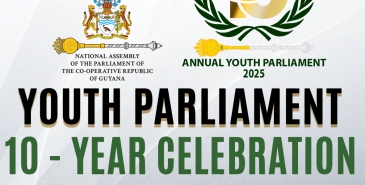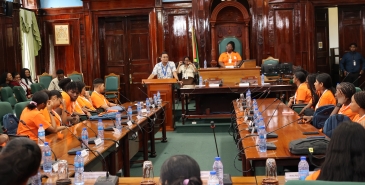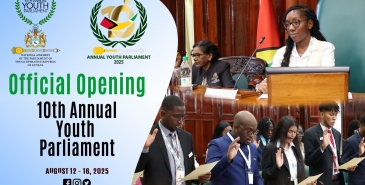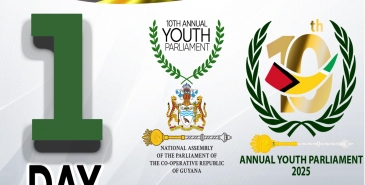Budget Debate 2013
Speech delivered at: 42nd Sitting- Tenth Parliament - 03 April, 2013
03 April, 2013
6467
Minister of Human Services and Social Security [Ms. Webster]: Mr. Speaker, I rise today in this honourable House to lend my support to Budget 2013 under the theme, Overcoming Challenges Together, Accelerating Gains for Guyana.
Let me first of all extend congratulations to my colleague, the Hon. Dr. Ashni Singh, the Minister of Finance, for articulating such a vision in this year's Budget presentation which contains key structural initiatives for continued growth in our economy.
Mr. Speaker, our Government remains committed to accelerating progress and development in Guyana.
I listened intently to the Hon. Member, Ms. Jennifer Wade, as she gave her presentation and I want to assure Ms. Wade that our Government is still a caring Government. The Hon. Member made mention of some staff of the Probation and Social Services Department in Region 5 as to how they conduct their work. I will say that the staff of the Probation and Social Services Department of the Ministry of Labour, Human Services and Social Security work beyond the call of duty. They are dedicated. I noted her comments on the Child Protection Agency, and I would like to assure this honourable House that, as our Ministry continues to expand our services throughout the country, we will certainly investigate all concerns and complaints provided against our officers. I want to assure this honourable House that Ms. Wade’s comments have not fallen on deaf ears.
I believe that we, as representatives of the people in this National Assembly, must be committed to working together for the benefit of all Guyanese. We must be steadfast in our endeavours and continue the process which began over two decades ago and which will enable our people to realise their dreams and aspirations, thereby making Guyana a better place.
The PPP/C Government has demonstrated, over the past years, through our policies and programmes, that we have a sustained track record. No one can deny the fact that the Guyana we see here today is vastly improved compared to what existed more than 20 years ago. Our approach has been one of targeted interventions with a focus on sustainability. The evidence is in the investments made across all the sectors and the support given to enable our private sector to prosper. These initiatives have enabled a record seven years of growth in our economy. Today, our citizens are beneficiaries of these initiatives. More so, if we were to look at the social sector, the programmes being implemented are all aimed at improving the quality of life of all Guyanese, which include our women, our children, the elderly and those vulnerable persons within our society, through targeted interventions.
Our Government's position is that every single Guyanese citizen must have access to the same opportunities, irrespective of where they live. It is, therefore, of utmost importance that greater emphasis will be placed upon the delivery of improved social services within our communities. It is to this end, in 2013, the Ministry of Labour, Human Services and Social Security, in accordance with its mandate, will focus on meeting human needs through the provision of human services. As stated in the Budget presentation, “This Government remains committed to ensuring that all children have access to the care they deserve, thus granting them the opportunity to attain the skills and knowledge to become productive citizens.”
In 2013, the Child Care and Protection Agency will continue to play a leading role in the investigative process of child abuse cases reported throughout the country. In fact, there was an increase in the number of child abuse cases investigated from 3,653 in 2011 to 3,690 cases in 2012. Of those cases, 396 children were successfully removed from abusive situations, and eighty-one (81) of these children were re-integrated into their biological families, from formal care, including foster care, residential care and kinship care.
In addition, the Agency provided family support through parental counselling services to 5,325 families in 2012. This year, emphasis will be placed upon the implementation of the Early Childhood Development Programme with the registration and licensing of all day care facilities for children.
There are currently in excess of 200 such facilities in operation throughout our country, and this year it is our intention to introduce night care facilities for children of single parents, in an effort to support those parents, particularly mothers who, by virtue of their employment, are required to work long hours.
This initiative is one of the clearest reflections of the fact that our Government has seen the need to reduce the vulnerability of our children being left without adequate supervision and care, with emphasis being placed upon the safety of our children. It is with this in mind that under the Family Assistance Programme, the Child Care and Protection Agency has conceptualised the initiative which will assist those disadvantaged and which will include our single and low-income parents. We continue to work towards the prevention of separation of our children from their families. Specially trained officers will be tasked with the responsibility to register and license these day care facilities as well as to monitor their operations to ensure that they operate in accordance with established standards.
Our Government has recognised the importance of investing in the most valuable resource which is vital to Guyana's continued development, our people. In addition, there are plans for the expansion and strengthening of the foster care and kinship care programme as an alternative care option for children at risk, whilst heightened focus would be given to reducing the number of children in institutional care by promoting family-based care. I am advised that this has been proven to be a better care option for our children, compared with institutional care.
Whilst there are some children who will have to remain in institutional care, greater emphasis will also be placed upon ensuring that all privately operated children's homes conduct their operations in accordance with the minimum standards and guidelines in place. There are currently visiting committees in place whose primary responsibility is to conduct inspections of these facilities and to monitor and evaluate the operations with a view to ensuring that there is compliance with the minimum standards.
Guidelines for developing policy regulations in early childhood development services have been developed by the CARICOM Secretariat as the first of its kind. These guidelines seek to standardise early childhood development services throughout the region, and are intended to support the establishment of protective mechanisms and benchmarks at the national level and provide a common methodology and set of principles in developing early childhood policy regulations and standard regimes.
Family Assistance
There will be increased psychosocial support and other assistance to families at risk for the prevention of child abuse and the separation of children. The Family Assistance Programme includes day care services support, school uniform assistance, skills training for parents and food assistance vouchers.
New Mahaica Children’s Home
The new state-of the-art Building which was constructed to house the Mahaica Children's Home has been completed and will be commissioned shortly. This facility will provide care and support for our children, including our teenage girls who have been abused. This year, special attention will be given to complement the existing Programme in place with the re-integration of teenage mothers into the school system. This is quite important as we must ensure that our young girls are educated and empowered. Day care services will also be provided to support teenage mothers in continuing their education and building a livelihood for themselves.
I am sure that you will agree that child protection is everyone's business. I wish to solicit the support of every segment of society. The Childcare and Protection Agency, recognising that partnerships in child protection are essential, has been making efforts to establish the necessary linkages with parents, Non-Governmental Organisations (NGOs) and other faith based organisations. The Agency will be continuing its efforts to establish these alliances to effectively meet the child protection needs of our children.
In this regard, our Government has put in place a robust legislative framework with the primary objective being to ensure the protection and equality of all our children in Guyana. However, we continue to examine existing legislation as well as initiate new ones to meet the demands of a changing society and environment. Guyana re-affirms its commitment to fulfilling its obligations under the Convention on the Rights of the Child. I must say that we have made progress on the implementation of the Convention, as well as consulting with other stakeholders engaged in children's issues.
Through funding provided by the United Nations Children’s Fund (UNICEF), capacity building workshops and training programmes will be conducted this year for the staff of the Child Protection Agency as the Administration continues to place emphasis upon enhancing our human capital, pursuant to realising our national goals.
In 2013, there will also be the re-organisation and de-centralisation of services provided by the Agency throughout the ten Administrative Regions, which I alluded to before. I wish to highlight also that this year the sum of $233.7 million has been budgeted to meet the current expenditure related to the Agency's operations. In fact, in this year's Budget, the Agency will be a separate programme for the first time.
We continue to exert all efforts to increase efficiency in the delivery of services to those vulnerable persons within our society. Later this month, the Centre for the Rehabilitation and Re-integration of the Homeless located at Onverwagt in Region 5 will be opened. This project became a reality as a result of bilateral relations between the Government of the Bolivarian Republic of Venezuela and the Government of Guyana. We are indeed grateful to the Government and people of Venezuela for this kind gesture.
The completion of this facility will house approximately 180 persons and will include male and female dormitories, and an administrative block among others. This signifies, once again, our Government's continued commitment and concern about the welfare of our citizens, especially those who are faced with difficult circumstances and those destitute persons who have nowhere to live.
These persons will be afforded the opportunity to access available support services. It must be noted that as part of the comprehensive approach to address the needs of those deemed vulnerable within our society, it is our intention to support the rehabilitation and re-integration of these individuals into society.
Mention was made of hopelessness and the suicide rate. Suicide, as we all know, is symptomatic of mental illness. I wish to reiterate the Ministry's commitment to understanding and addressing the mental and emotional wellness of our nation's population, particularly the youths in our society, through the strengthening and expansion of our Probation and Social Services Department. Our Government recognises that development is not only at the infrastructural level, hence the Ministry of Human Services and Social Security has consistently been expanding its counselling and social services programme throughout the Regions, aimed at creating an environment where persons can have opportunities for emotional support to be given through our counselling centres.
This Government's concern for the elderly has been evident. Today, every Guyanese who resides here in Guyana, aged 65 years and older, is eligible to receive the monthly old age pension.
In July, 2012, Cabinet appointed members of the National Commission on the Elderly. The Commission is comprised of eleven (11) members; amongst them are prominent leaders of faith based organisations, health professionals and retired public officers. The Commission has since engaged various stakeholders during a workshop in December, 2012, in collaboration with the United Nations Fund for Population and Development. Among the priorities of the National Commission on the Elderly are:
(i) developing a comprehensive action plan;
(ii) conducting public education awareness programmes to sensitise persons about issues which affect the elderly;
(iii) developing minimum standards for all homes and facilities providing care to the elderly with a view to possible legislation being formulated;
(iv) preventing abuse of the elderly;
(v) development of a curriculum on gerontology; and
(vi) conducting training programmes for caregivers employed in institutions that provide care for the elderly.
Improving the quality of life of our senior citizens has always been and continues to be important to this Government. We continue to view our interventions for our senior citizens not as one item and one-off injections, but rather as a comprehensive package of support and services. When one adds the eight months of old age pension increases and the electricity assistance, it reflects more than a 33 per cent increase on a monthly basis for our pensioners.
In Budget 2013, I wish to indicate that I am cognisant about comments made about a request for an increase in the monthly rate payable to pensioners. Every month, if we were to do the calculations, $990 is given for water rates to pensioners in Georgetown via Budget 2013. Now, there is an increased pension of $12,500 monthly. Added to that, there is an electricity assistance, which, if one calculates it, works out to approximately $1,667 to offset the cost of electricity bills, which totals about $15,157, which is in excess of $15,000 per month in financial support.
In order to responsibly increase old age pension to even higher levels in the years ahead and in light of the fiscal sustainability constraints, it will be necessary to consider some means of verifying need and income levels so that our expenditure is targeted in a pro-poor manner.
In short, Mr. Speaker, do we, in this honourable House, as together we ensure a pro-poor budget, wish to have the retired, well-to-do pensioner who lives in a gated community and has a business be entitled to receive the same benefits as the senior citizen who lives alone in a rented home, striving hard to meet monthly needs.
That is not all. The package of support goes beyond the $15,157. Our heath sector is ensuring that greater focus is paid to chronic non-communicable diseases as life expectancy issues of our senior citizens now require greater attention as we are living longer in Guyana, and this issue must be addressed.
And we go on further, this year, the Commission for the Elderly also will look at standards for senior citizens’ care homes and hospitals to ensure that we do not write-off our elderly simply because they are above the age of 70, which is the life expectancy mark.
We will work to establish a national register for shut-ins with a view to developing individual case management plans and providing training to empower caregivers. I had the pleasure of visiting one of our senior citizens who attained the age of 90 and I was heartened to learn that part of her secret to long life was maintaining a healthy diet of locally grown fruits, vegetables, provisions and fish. I am sure her story is not uncommon and will be repeated over the years to come. As the benefits of the Grow More Food Campaign continue to redound to ensure greater food supplies at affordable prices in both our markets and our kitchen gardens, this will, indeed, contribute to the physical and economic health of all our people, especially our pensioners.
Our women have made significant strides in Guyana's development in diverse fields, and more so in national decision making. Indeed, our women contribute to national development in a significant way. In fact, Guyana was ranked 42nd in the World Economic Forum Gender Gap Index out of 145 countries, and ranked 32nd for the political empowerment of women, 25th for women in Parliament together with women holding ministerial portfolios, and for educational attainment Guyana ranked 28th out of 135 countries. These indicate that our women are indeed poised to play a greater role in our country’s development. Our women are our nation's wealth, and they are valued members of our society.
Violence against women and girls is one of the most widespread violations of human rights, which is prevalent in every continent and in every culture. It manifests itself in many forms, transcends race and class, and occurs in diverse settings. It presents a challenge which causes significant harm to the individual and degrades the fundamental moral and social fabric of society. It impedes social progress and development for advancing women’s rights.
Our development as a nation is dependent upon all of us in this honourable House being united on this front. It is, therefore, of utmost importance that we recognise the need to pay critical attention to socio-cultural expressions and stereotypes that degrade women and perpetuate the myth that women are an inferior class.
We need to inculcate in our young women a deeper sense of awareness of their own values and recognition of their own self respect and the need to demand that respect from others. These are the types of interventions which will no doubt assist in our efforts to prevent and eliminate violence against women and girls in our society.
During 2012, the Ministry launched a National Conversation on Domestic Violence and consultations were held with stakeholders throughout the ten Administrative Regions. I am proud to say today that the draft national action plan is currently being finalised and will be circulated shortly.
At the recent International Women’s Day symposium, which was held on March 8, 2013, participants made recommendations which emanated from group discussions held during the symposium in thematic areas comprised of social issues, employment opportunities, job creation and poverty alleviation, equal pay for equal work, women's rights from law to practice, women in leadership, and empowering our women to become entrepreneurs in a changing world. The draft report will be circulated shortly with specific recommendations made which also include possible amendments to some existing pieces of legislation.
This year, the national machinery for women – the Women's Affairs
Bureau (WAB) – will conduct public awareness sessions on the new sexual
offences legislation and continue educational sessions for women on the Low Carbon Development Strategy (LCDS) throughout the Regions. In addition, the Bureau will collaborate with line Ministries on gender issues and gender based violence, utilising the gender focal point of each Ministry.
Mr. Speaker, we continue to deliver on our Government's commitment to assist single parents and to support their efforts to achieve a better quality of life. This year, more than 400 single parents will be the beneficiaries of specially targeted training programmes which will further support their development. The Women of Worth (WOW) Programme will be reinvigorated with the Programme being launched in Regions 1 and 7 so as to ensure that single parent women in these Regions have access to this initiative, whilst supporting their quest to become entrepreneurs, thereby changing their economic circumstances in the future. To date, there are more than 200 applications from prospective applicants within those Regions.
We are supporting their quest to become entrepreneurs and plans are ongoing to assist beneficiaries under this Programme in the cottage industry to access markets for their products by collaboration and partnership with private sector and businesses, as we seek more opportunities to support the empowerment of our women to realise their dreams.
Towards the last quarter of 2012, the Ministry of Labour, Human Services and Social Security commenced work for the preparation of a strategic plan in an effort to strengthen and improve the administration of its operations and programmes nationwide, with the primary objective being to develop a five-year strategic plan for the sector.
As much as we, in the Ministry of Labour, Human Services and Social Security, advocate for every family to work to overcome challenges together, we, as a national family, must embrace the theme of Budget 2013, Overcoming Challenges Together, Accelerating Gains for Guyana. I firmly believe that if we maintain a collective view and vision and our role in this House is to work together in service to the cause of national development, then our every action and intervention must support the achievement of this vision. And before we act or speak, we should pose the first question to ourselves: how will my actions and my interventions contribute to national development? That singleness of thought and purpose must be our driving force. In so doing, Mr. Speaker, we will undoubtedly be able to capitalise on the opportunities that the current dispensation provides. History and the people of this country will ultimately judge us and I trust that we will not be found wanting.
I congratulate my colleague, the Hon. Dr. Ashni Singh, for his presentation of Budget 2013 and commend it to this honourable House.
Thank you, Mr. Speaker. [Applause]
Speech delivered by:
What's New

17 August, 2025
10th Annual Youth Parliament Closes: Celebrating a Decade of Impact, Excellence, and Youth Empowerment10th Annual Youth Parliament Closes: Celebrating a Decade of Impact, Excellence, and Youth Empower

13 August, 2025
Youth Parliamentarians Assemble for Grand Rehearsals for the 10th Annual Youth Parliament

12 August, 2025
10th Annual Youth Parliament Kicks Off – Young Voices, Bold Ideas, Bright Futures!

11 August, 2025
10th Annual Parliament Kicks off tomorrow

